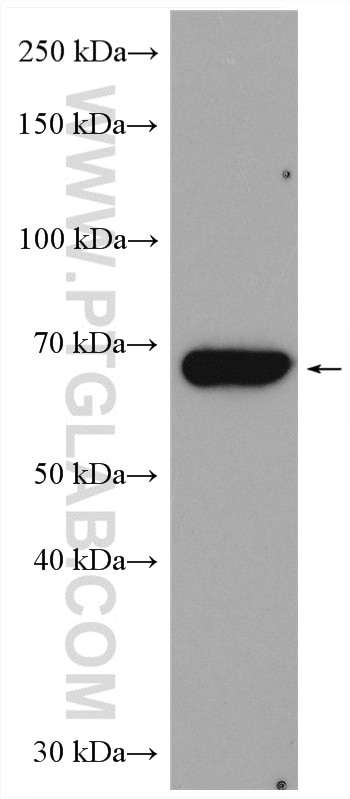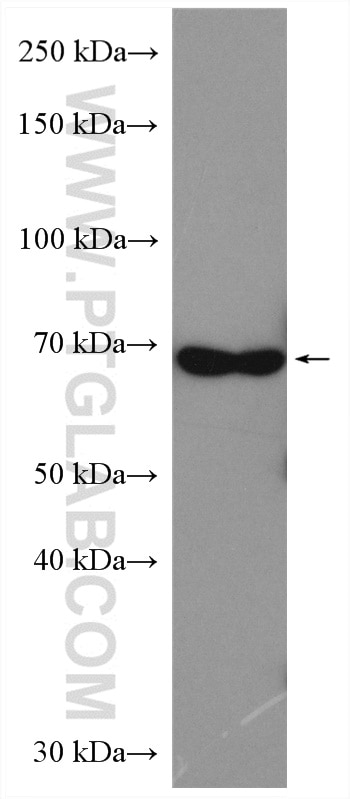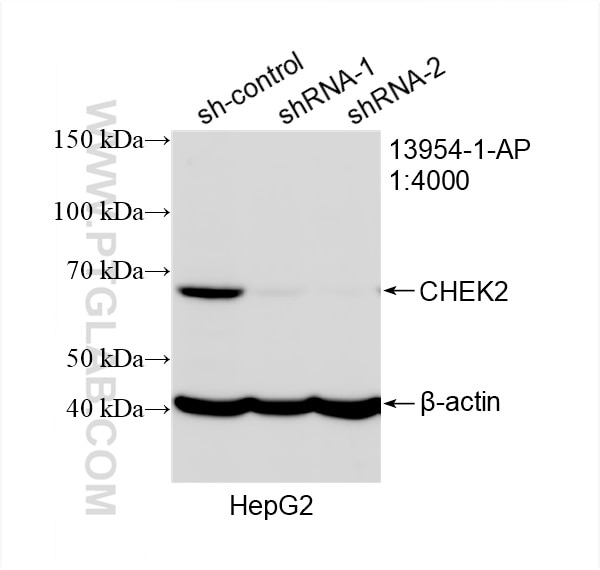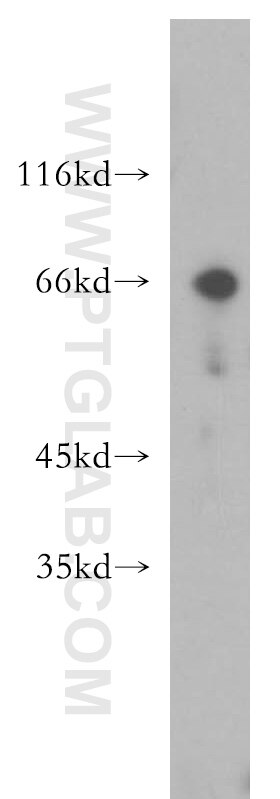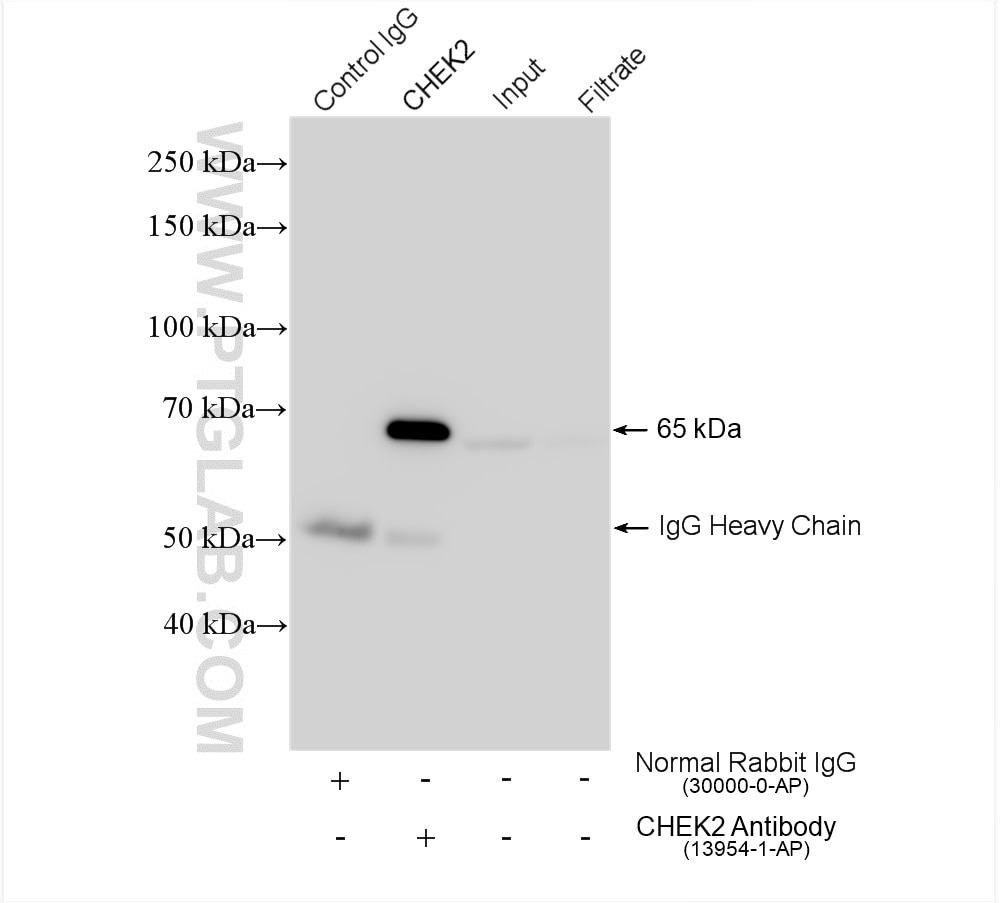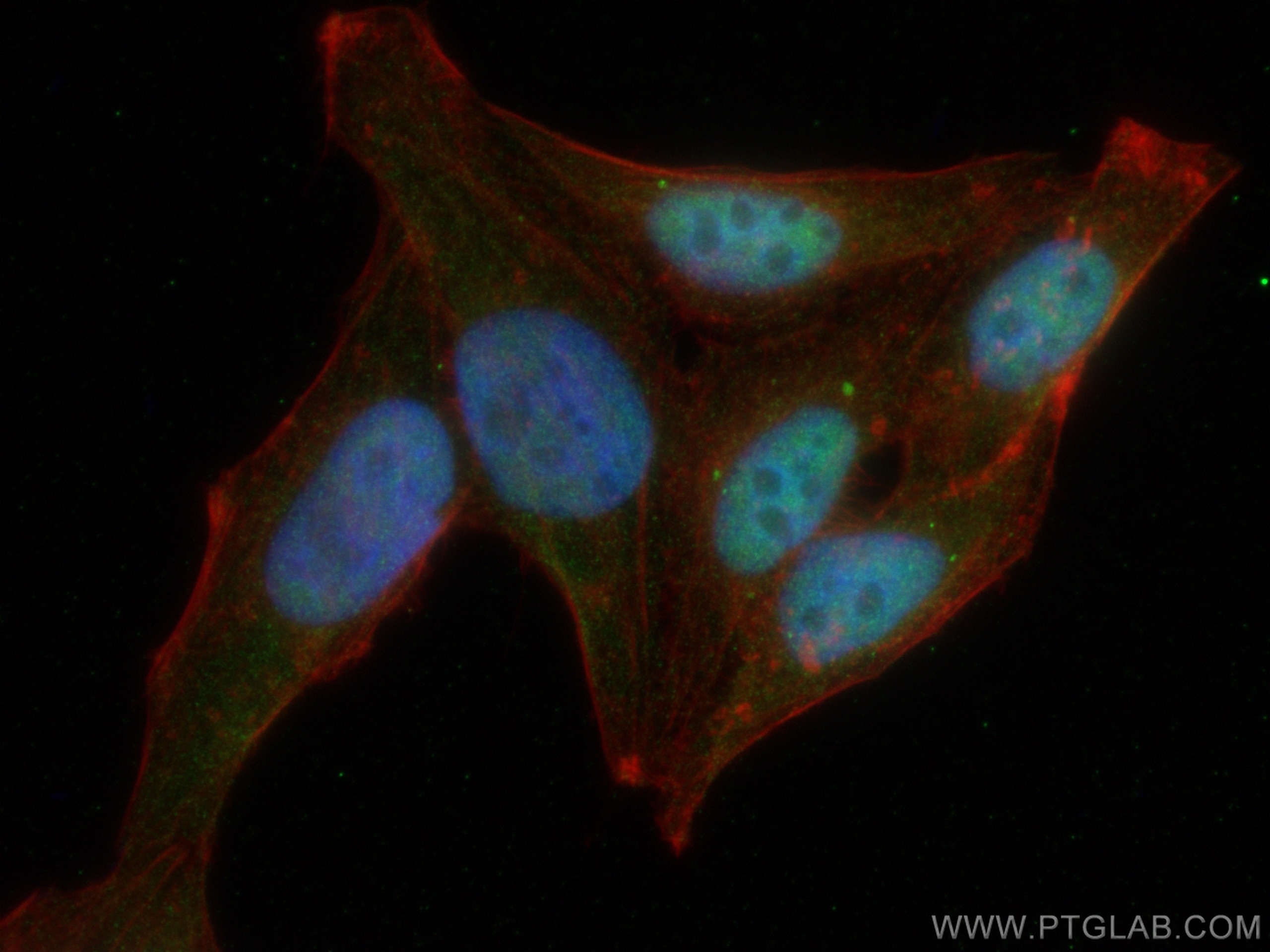Validation Data Gallery
Tested Applications
| Positive WB detected in | HL-60 cells, HeLa cells, HepG2 cells |
| Positive IP detected in | HeLa cells |
| Positive IF/ICC detected in | HepG2 cells |
Recommended dilution
| Application | Dilution |
|---|---|
| Western Blot (WB) | WB : 1:500-1:1000 |
| Immunoprecipitation (IP) | IP : 0.5-4.0 ug for 1.0-3.0 mg of total protein lysate |
| Immunofluorescence (IF)/ICC | IF/ICC : 1:50-1:500 |
| It is recommended that this reagent should be titrated in each testing system to obtain optimal results. | |
| Sample-dependent, Check data in validation data gallery. | |
Published Applications
| WB | See 39 publications below |
| IHC | See 2 publications below |
| IF | See 2 publications below |
Product Information
13954-1-AP targets CHEK2 in WB, IHC, IF/ICC, IP, ELISA applications and shows reactivity with human, mouse, rat samples.
| Tested Reactivity | human, mouse, rat |
| Cited Reactivity | human, mouse, rat |
| Host / Isotype | Rabbit / IgG |
| Class | Polyclonal |
| Type | Antibody |
| Immunogen |
CatNo: Ag5065 Product name: Recombinant human CHEK2 protein Source: e coli.-derived, PGEX-4T Tag: GST Domain: 1-351 aa of BC004207 Sequence: MSRESDVEAQQSHGSSACSQPHGSVTQSQGSSSQSQGISSSSTSTMPNSSQSSHSSSGTLSSLETVSTQELYSIPEDQEPEDQEPEEPTPAPWARLWALQDGFANLECVNDNYWFGRDKSCEYCFDEPLLKRTDKYRTYSKKHFRIFREVGPKNSYIAYIEDHSGNGTFVNTELVGKGKRRPLNNNSEIALSLSRNKVFVFFDLTVDDQSVYPKALRDEYIMSKTLGSGACGEVKLAFERKTCKKVAIKIISKRKFAIGSAREADPALNVETEIEILKKLNHPCIIKIKNFFDAEDYYIVLELMEGGELFDKVVGNKRLKEATCKLYFYQMLLAVQYLHENGIIHRDLKPE 相同性解析による交差性が予測される生物種 |
| Full Name | CHK2 checkpoint homolog (S. pombe) |
| Calculated molecular weight | 61 kDa |
| Observed molecular weight | 65 kDa |
| GenBank accession number | BC004207 |
| Gene Symbol | CHEK2 |
| Gene ID (NCBI) | 11200 |
| RRID | AB_10598159 |
| Conjugate | Unconjugated |
| Form | |
| Form | Liquid |
| Purification Method | Antigen affinity purification |
| UNIPROT ID | O96017 |
| Storage Buffer | PBS with 0.02% sodium azide and 50% glycerol{{ptg:BufferTemp}}7.3 |
| Storage Conditions | Store at -20°C. Stable for one year after shipment. Aliquoting is unnecessary for -20oC storage. |
Background Information
Chk2(Checkpoint kinase 2) is also named as CDS1, CHEK2, RAD53 and belongs to the CHK2 subfamily. It is a protein kinase that is activated in response to DNA damage and involved in cell cycle arrest. It also mediates the induction of senescence in fibroblasts, but is dispensable for the induction of telomere dysfunction checkpoints at the stem and progenitor cell level(PMID:20577265). This protein can exsit as a dimer (PMID:19782031). Active forms of CHEK2 devoid of phosphorylation at Thr-68 can form unstable dimers(PMID:12386164). Defects in CHEK2 is a cause of susceptibility to breast cancer (BC)(PMID:21618645). It has 12 isoforms produced by alternative splicing.
Protocols
| Product Specific Protocols | |
|---|---|
| IF protocol for CHEK2 antibody 13954-1-AP | Download protocol |
| IP protocol for CHEK2 antibody 13954-1-AP | Download protocol |
| WB protocol for CHEK2 antibody 13954-1-AP | Download protocol |
| Standard Protocols | |
|---|---|
| Click here to view our Standard Protocols |
Publications
| Species | Application | Title |
|---|---|---|
Cell Death Differ ZNF451 collaborates with RNF8 to regulate RNF168 localization and amplify ubiquitination signaling to promote DNA damage repair and regulate radiosensitivity | ||
PLoS Biol A long noncoding RNA sensitizes genotoxic treatment by attenuating ATM activation and homologous recombination repair in cancers. | ||
Oncogene TRIM24 is critical for the cellular response to DNA double-strand breaks through regulating the recruitment of MRN complex | ||
Clin Transl Med Single-cell profiling-guided combination therapy of c-Fos and histone deacetylase inhibitors in diffuse large B-cell lymphoma. | ||
Int J Nanomedicine TiO2 Nanoparticles Caused DNA Damage in Lung and Extra-Pulmonary Organs Through ROS-Activated FOXO3a Signaling Pathway After Intratracheal Administration in Rats. |

